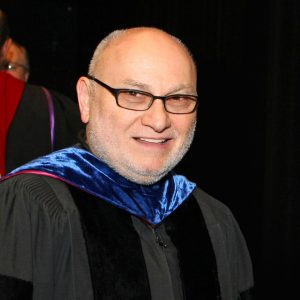Recent works by faculty members Robert Mendelsohn, Joel Weinberger, Jairo N. Fuertes, Jacques Barber and J. Christopher Muran burnish the Derner School’s reputation as a world leader in psychoanalytic research.

Robert Mendelsohn, PhD
Is Sigmund Freud, the founder of psychoanalysis, still relevant today? While most psychology students agree that Freud’s work on talk therapy was groundbreaking, they tend to believe that many of his theories of development are hopelessly out-of-date. That’s a belief that Robert Mendelsohn, PhD, professor of psychology, wants to dispel.
“As I tell my students, Freud was ahead of his time in many ways,” Dr. Mendelsohn said. “He understood some basic differences between men and women before we understood the chromosomal differences between the sexes. He also understood sexuality, sexual identity and the whole concept of binary versus nonbinary. But, at the same time, he was sexist and naive about other cultures. We have to put some of his ideas aside even though others are useful.”
In 2021, Dr. Mendelsohn published Freudian Thought for the Contemporary Clinician: A Primer on Psychoanalytic Theory (Routledge),1 based on the course he teaches to first-year candidates in Adelphi’s clinical psychology doctoral program. He is one of several faculty members in Adelphi’s Gordon F. Derner School of Psychology—ranked fourth in the world in the topic area of psychology psychoanalysis by the Center for World University Rankings—who have written or contributed to key scholarly works over the past two years. Other titles include Joel Weinberger, PhD’s The Unconscious: Theory, Research, and Clinical Implications (Guilford Press, 2021) and Jairo N. Fuertes, PhD’s The Other Side of Psychotherapy: Understanding Clients’ Experiences and Contributions in Treatment (American Psychological Association, 2022).

J. Christopher Muran, PhD
What makes the Derner School unique, according to J. Christopher Muran, PhD, the school’s interim dean, is its emphasis on psychodynamic therapy. “We’ve been a leader in psychodynamic therapy since the 1950s,” he said. “And over the past four decades, we’ve made a significant contribution to the psychotherapy integration movement, which involves combining techniques from a variety of therapeutic models. That’s very unusual for a university.”
Dr. Muran collaborated with Jacques Barber, PhD, dean of the Derner School, on a revised chapter on psychodynamic therapy in Bergin and Garfield’s Handbook of Psychotherapy and BehaviorChange, 7th Edition (Wiley, 2021), widely considered the essential reference volume for psychotherapy research.

Jacques Barber, PhD
“This is a significant tribute to Dr. Barber’s work,” Dr. Muran said, adding that Dr. Barber was recognized with the International Society for Psychotherapy Research Distinguished Research Career Award in 2014. “Being asked to author this chapter in the last two editions is an acknowledgment of his premier status in the field.”
When it was originally written in 2013, the chapter served as an in-depth discussion of the efficacy of psychodynamic therapy, a psychoanalytic approach that places an emphasis on the relationship between the analyst and patient. Drs. Barber and Muran, along with several of their students, conducted multiple meta-analyses of existing research on the efficacy of dynamic therapy for depression, anxiety disorders and personality disorders.
The newly revised chapter updates the research their team conducted a decade ago. “It includes three new meta-analyses demonstrating that psychodynamic therapy is indeed efficacious for these disorders,” Dr. Muran said. “It also reviews the empirical literature on various factors related to treatment success and various change mechanisms, such as the therapeutic alliance.”
According to Dr. Muran, recent work by other Derner School professors is also expanding the field’s body of knowledge. He pointed particularly to Dr. Mendelsohn’s book on Freud, which illustrates the potential application of Freud’s ideas to issues psychotherapists face today. Using Freud’s writing from 1895 to 1923 as a framework, Dr. Mendelsohn charts Freud’s creation of psychotherapy as well as the development of theories that have influenced generations of clinicians—and aided their patients. “Before Freud, neurosis was considered an incurable illness or a defect in one’s character,” Dr. Mendelsohn said. “He showed us that it is not only understandable, but fixable.”
Although many early-stage doctoral students have read about Freud, Dr. Mendelsohn noted, it’s rare that they have delved into his writings. “They’re often surprised that Freud was ahead of his contemporaries when it came to gender and sexuality; he wrote extensively about topics others considered taboo. The purpose of this book—of all my work, really—is to show that Freud wasn’t just a revolutionary in his time. He still is today.”
1 Mendelsohn, Robert. Freudian Thought for the Contemporary Clinician: A Primer on Psychoanalytic Theory. Routledge, 2022.
2 Barber, Jacques P, and J. Christopher Muran, Kevin S McCarthy, et al. “Research on Dynamic Therapies.” Bergin and Garfield’s Handbook of Psychotherapy and Behavior Change, 7th, edited by Michael Barkham, Wolfgang Lutz, and Louis G. Castonguay. Wiley, 2021.